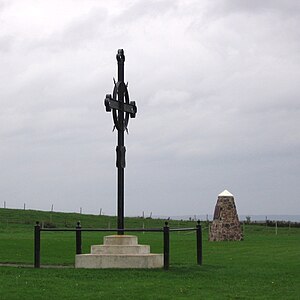Siege of Grand Pre
| Siege of Grand Pre | |||||||
|---|---|---|---|---|---|---|---|
| Part of Father Le Loutre’s War | |||||||
 Site of Siege of Grand Pre, Hortonville, Nova Scotia |
|||||||
|
|||||||
| Belligerents | |||||||
|
Wabanaki Confederacy (Mi'kmaq militia Maliseet militia) Penobscot Acadia militia |
|
||||||
| Commanders and leaders | |||||||
| unknown |
Captain John Handfield John Hamilton (POW) |
||||||
| Strength | |||||||
| 300 Mi'kmaq, Maliseet, and Acadians | unknown British regulars | ||||||
| Casualties and losses | |||||||
| unknown | 25 prisoners; 2 killed | ||||||
The Siege of Grand Pré happened during Father Le Loutre’s War and was fought between the British and the Wabanaki Confederacy and Acadian militia. The siege happened at Fort Vieux Logis, Grand Pré (present-day Hortonville, Nova Scotia). The native and Acadia militia laid siege to Fort Vieux Logis for a week in November 1749. One historian states that the intent of the siege was to help facilitate the Acadian Exodus from the region.
Despite the British Conquest of Acadia in 1710, Nova Scotia remained primarily occupied by Catholic Acadians and Mi'kmaq. By the time Cornwallis had arrived in Halifax, there was a long history of the Wabanaki Confederacy (which included the Mi'kmaq) protecting their land by killing British civilians along the New England/ Acadia border in Maine (See the Northeast Coast Campaigns 1688, 1703, 1723, 1724, 1745, 1746, 1747).
To prevent the establishment of Protestant settlements in the region, Mi'kmaq raided the early British settlements of present-day Shelburne (1715) and Canso (1720). A generation later, Father Le Loutre's War began when Edward Cornwallis arrived to establish Halifax with 13 transports on June 21, 1749. By unilaterally establishing Halifax the British were violating earlier treaties with the Mi'kmaq (1726), which were signed after Father Rale's War.
...
Wikipedia
